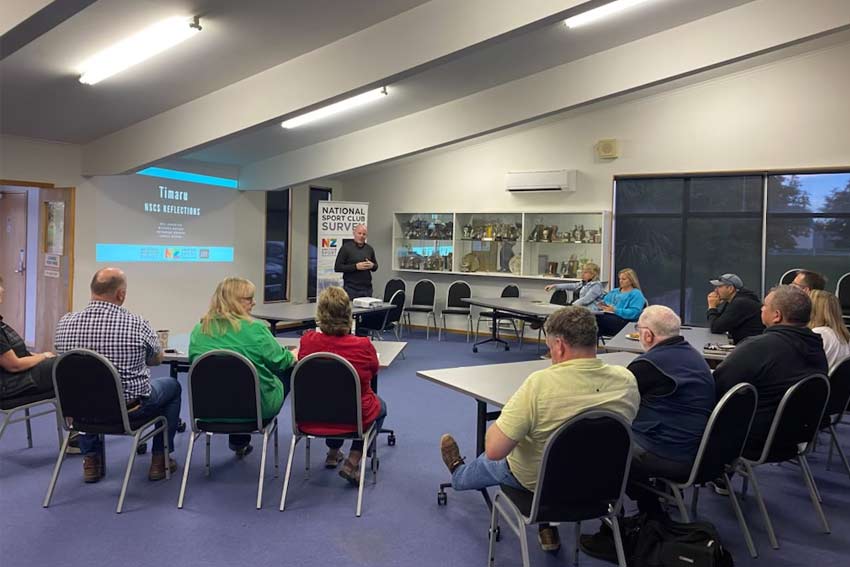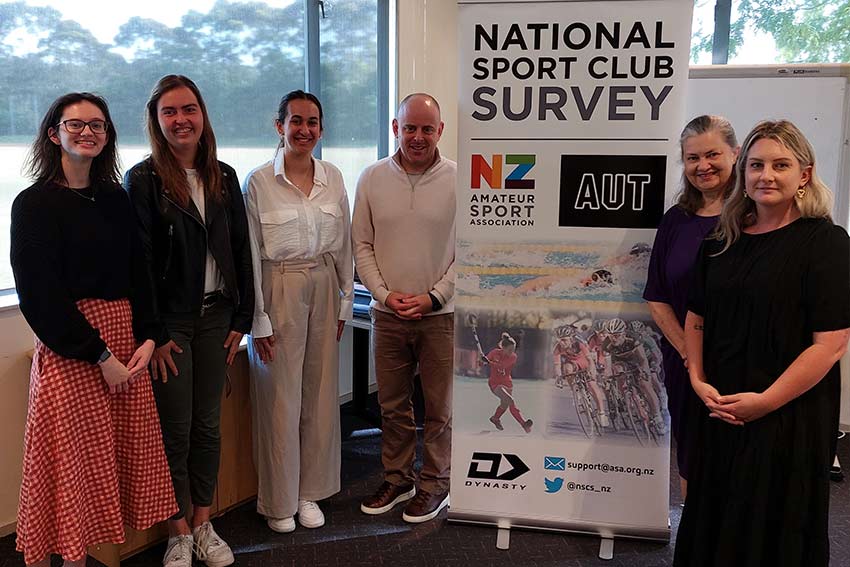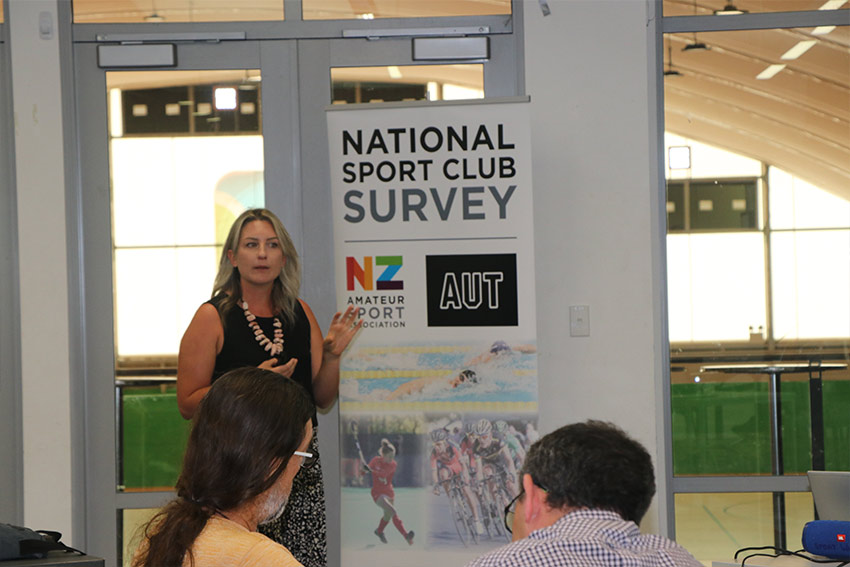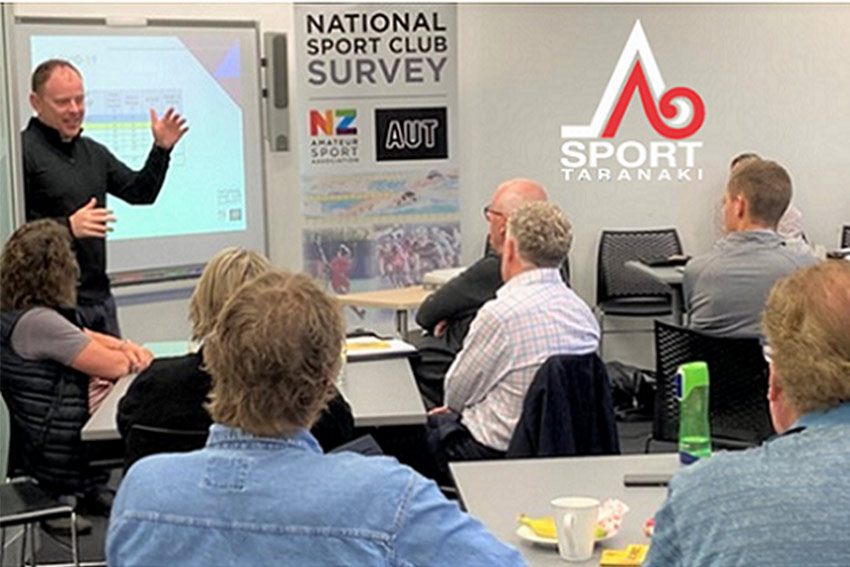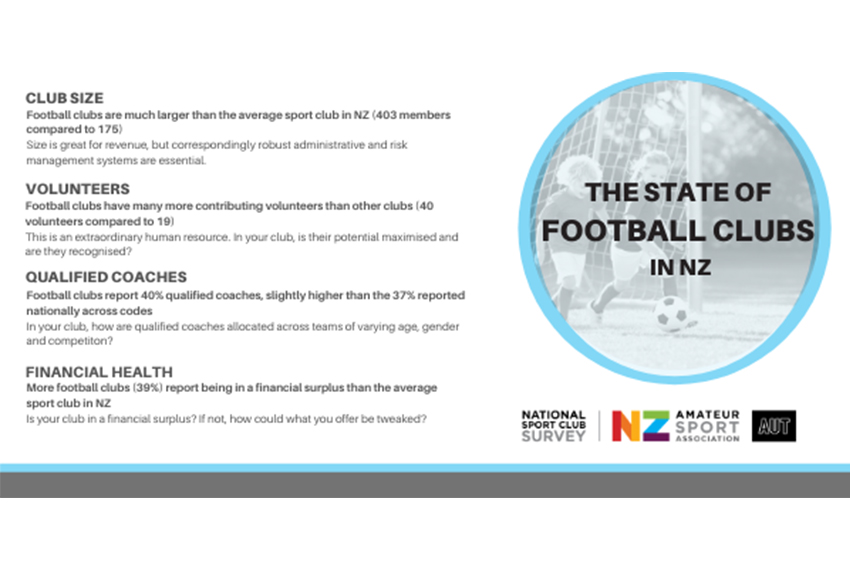National Sport Club Survey (NSCS)
Since 2018, the National Sport Club Survey (NSCS) has generated insights about the management and operations of New Zealand’s community sport clubs.
The NSCS is run as a partnership between AUT SPRINZ and the New Zealand Amateur Sport Association (NZASA). Every sport club in New Zealand is invited to participate in this annual project. That now includes more than 7000 clubs across 90 sports and all 16 regions of New Zealand.
The multi-sport, nationwide focus on clubs as organisational entities complements other projects which capture the perspective of single sports, single regions or individuals as participants.
Membership size/trends, financial performance, governance metrics and more are being tracked annually. Specific annual themes also feature.
Insights are disseminated through regional workshops (often in partnership with RSTs), social media infographics, sport/region info sheets and more.
We work with NSOs, RSTs, RSOs and others so that NSCS insights can be used for a variety of strategic purposes.
NSCS Insights have been presented at the conferences of the Sport Management Association of Australia & New Zealand (SMAANZ) and the European Association of Sport Management (EASM). The New Zealand Herald, Otago Daily Times, Radio New Zealand and others have reported on NSCS insights.
Contact us
Mel Johnston (melody.johnston@aut.ac.nz)
Follow us on twitter: @NSCS_NZ
2023 NSCS
The 2023 NSCS (6th annual) closed the week of 4 Sept. Every sport club in NZ was invited to participate and hundreds did so.
Themes this year are Casualisation, Disability Sport, Schools & Integrity.
2023 NSCS Workshops will be in Auckland and elsewhere around New Zealand.
These workshops will be of interest to RSO & NSO staff, board chairs/members from all codes as well as club representatives.
Stay tuned for more information!
To express interest in a workshop contact melody.johnston@aut.ac.nz
The 2020 NSCS was delayed by two weeks as a result of COVID-19 restrictions. 1187 clubs responded capturing the experience of about 200,000 Kiwis.
2020 themes were COVID-19 Impacts, Resilience, Innovation and regional workshops were held in West Auckland, New Plymouth, Hamilton.
Selected insights
- In the midst of 2020 COVID-19 lockdowns, more than 90% of clubs reported they would be “shortly back to normal” or “make it through”
- The larger a club’s budget, the fewer women involved in leadership
- 40% of clubs reported innovation from the past 12 months, often related to partnerships or technology
In 2019, the NSCS club database was first developed with the goal of having an email address for every club in New Zealand. 787 sport clubs across all of New Zealand’s 16 regions took part in the research.
2019 themes were Commercialisation, Amateurism and regional workshops were held in Auckland (North Shore), Wellington, Christchurch, Dunedin.
Selected insights
- Many clubs of over 200 members are growing, while those less than 100 are shrinking
- The optimal tenure for board/committee members in a sport club is no more than 5 years
- At 43%, there are more women involved in club governance than at higher levels within the sector, but just 9% are under less than 30 years old
The project launched in 2018 with a total of 172 clubs, across 16 sports from around the country participating. Clubs were invited from a list of incorporated societies.
Regional workshops were held in South Auckland.
Selected insights
- Only half of community sport clubs report having a strategic plan
- 78% of clubs reported either stable or increasing membership
- Most clubs have a “home” consisting of land and/or facility
The 2021 NSCS was open from 19 August – 3 September and almost 1200 clubs engaged from across the whole country.
Initial Insights indicate that most clubs are surviving the lockdowns, but engaging women and girls remains a work in progress. Check the Documents section on this page for ongoing release of insights.
Themes
- Women and Girls
- Diversity and Inclusion
- Performance Pathways
The 2022 NSCS was live in September and about 800 clubs participated.
Insights indicated that clubs are struggling in their engagement with councils but provision of sport for women and girls is improving!
Of concern is that few young people are on sport club boards/committees and just 1/3 of sport clubs have a woman as chair or president.
In partnership with local RSTs, 2022 NSCS Workshops were facilitated in West Auckland, North Harbour, Napier, Wellington, Lower Hutt, Palmerston North, Dunedin, Timaru and Christchurch.
Themes
- Major event leveraging
- Club/council intersection
- Recent legislative change for clubs.
Sport community feedback on the NSCS
- “We are a bit light on insights where we can measure and compare management and performance with other sports codes”
North Island Gymnastics Club - “(The NSCS) could help to reinforce and complement our Active NZ and VoP data”
South Island Regional Sport Trust - “Thanks for presenting (at the regional workshop). I look forward to sharing insights with our member clubs”
North Island Regional Sport Organisation - “The data collected is awesome and would definitely be useful to us on a larger scale”
North Island Regional Sport Trust - “This is a great opportunity and I’m always grateful when organisations with specific expertise make things available that support sport so well”
National Sport Organisation - “We run some annual research here covering similar topics but… the club picture would be valuable to support our local insights and knowledge”
South Island Regional Sport Trust
Watch: The NSCS and 2022 Matariki Award

Our partners
Our people
- Michael Naylor
Research lead, AUT - Mel Johnston
Research lead, AUT - Gordon Noble-Campbell
Project partner, NZASA - Cushla Tangaere-Manuel
Project Management Team, NZ Rugby - Lisa Jones
Project Management Team, Cricket Wellington - Linden Moore
Project Assistant - Katharine Hoskyn
AUT Researcher - Geoff Dickson
SPRINZ research associate - Sophie Leveridge
AUT BSR Graduate
Documents
- 2023 ITP Report – Integrity in Community Sport
- 2022 ITF FFE Paper
- 2021 NSCS Insights (Overview)
- 2021 NSCS Insights (FFE 1 & 2)
- 2021 NSCS Insights (Incorporated Societies)
- 2021 NSCS Insights (Auckland Region)
- 2021 NSCS Media Release
- EASM 2020 – Diversity
- SMAANZ 2020 - Innovation
- 2020 NSCS Waikato
- 2019 NSCS Auckland/Wellington
- 2019 Report
- 2018 Report
*From 2020 Insights disseminated via infographics and other means
